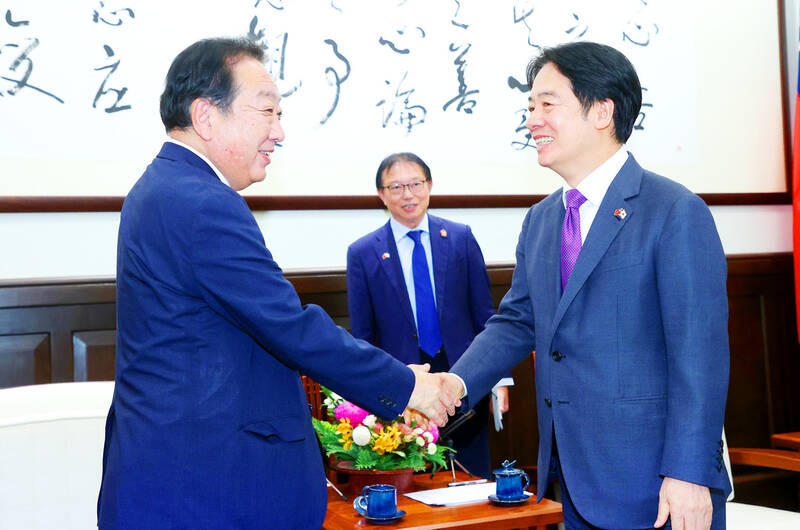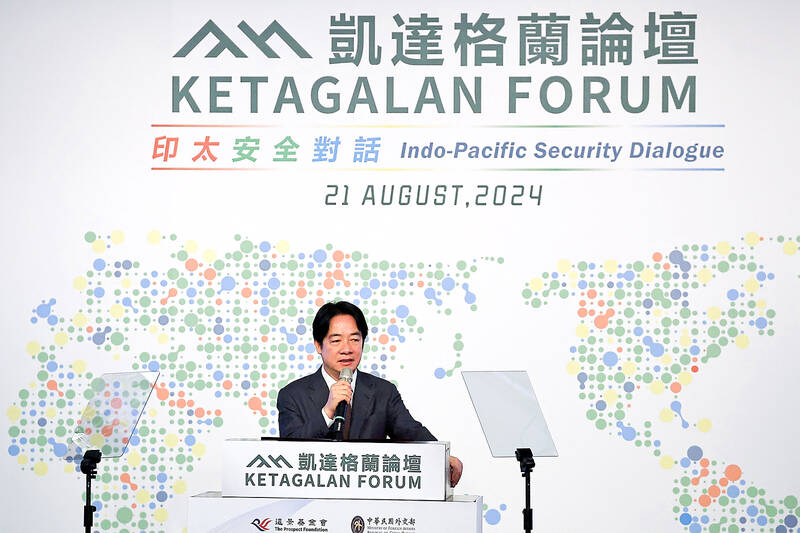China’s authoritarian expansionism would not stop with Taiwan, President William Lai (賴清德) said yesterday, calling for solidarity among the world’s democracies to check Beijing’s territorial ambitions.
Taiwan is determined to become a decisive force for democracy, peace and prosperity, standing side-by-side with its democratic partners to confront authoritarian expansionism and protect shared values, he told the annual Ketagalan Forum on Indo-Pacific security in Taipei.
Authoritarianism is now a global challenge, Lai said, using as examples Chinese military expansionism, economic coercion and the use of hybrid warfare tactics such as cyberattacks and cognitive warfare.

Photo: CNA
“We are all fully aware that China’s growing authoritarianism will not stop with Taiwan, nor is Taiwan the only target of China’s economic pressures,” he said. “China intends to change the rules-based international order. That is why democratic countries must come together and take concrete action.”
Taiwan “will not be intimidated” in confronting the security threat posed by China and upholding its responsibility to regional peace and stability as part of the first island chain, Lai said.
Detailing his four-pillar plan for peace — a policy he discussed while campaigning to be president — Lai said the administration’s first order of business is to bolster Taiwan’s defensive capabilities.

Photo: Reuters
Military spending is being increased to ensure Taiwan is more self-reliant regarding national defense, Lai said, adding that the policy is based on domestic production, foreign arms procurement and the creation of a technology transfer mechanism for emerging technologies.
Taiwan must also increase economic security by diversifying investments to spread trade risks and reduce its dependency on China, Lai said.
China accounted for 11.4 percent of Taiwan’s foreign investments last year and 31.2 percent of the nation’s trade volume in the first quarter, compared with 83.8 percent and 43 percent in 2010 respectively, he said.
The government is pursuing trade agreements with nations such as Australia, Canada, Japan, Lithuania, South Korea and the US to increase economic resilience, Lai said.
Taiwan has entered second-phase negotiations with Washington on the US-Taiwan 21st Century Trade Initiative and recently signed a deal with Ottawa, he said.
His administration plans to deepen its partnerships with other democracies and the forum is a part of that effort, he said.
Those attending this year’s forum are to deliberate Taiwan’s role in the push to stabilize global supply chains, he said, adding that the government is working with other nations to create “democracy chips.”
Taiwan would enhance cooperation with other democracies to deter aggression from China, prevent the rise of conflicts in the region and “achieve our goal of peace through strength,” Lai said.
As a responsible member of the international community intent on maintaining the “status quo” in the Taiwan Strait, the nation would not shy away from conducting talks with Beijing under the conditions of equality and dignity, he said.
Former Japanese prime minister Yoshihiko Noda told the forum that Taiwan and Japan have signed more than 60 cooperative agreements, including a bilateral investment agreement and a commitment to realizing the Treaty on Open Skies.
Japan would back Taiwan’s bid to join the Comprehensive and Progressive Agreement for Trans-Pacific Partnership as the two sides share the universal values of freedom, democracy, human rights and rule of law, he said.
Taiwan’s exclusion from the WHO undermines the global effort to protect health, and he supports the meaningful participation of Taiwan in the World Health Assembly, the WHO’s decisionmaking body, Noda said.
Citing comments by heads of state calling for peace and stability in the Taiwan Strait, he said that the international community has reached a consensus on Taiwan’s importance to the rules-based global order.
Japan, with its close ties to Taiwan, should lead the effort to inform the world about its significance, Noda said, adding that he is in “staunch opposition to any unilateral attempt to change the status quo by force or coercion.”
Disputes between Taiwan and China must be resolved peacefully, he said.

CHAOS: Iranians took to the streets playing celebratory music after reports of Khamenei’s death on Saturday, while mourners also gathered in Tehran yesterday Iranian Supreme Leader Ayatollah Ali Khamenei was killed in a major attack on Iran launched by Israel and the US, throwing the future of the Islamic republic into doubt and raising the risk of regional instability. Iranian state television and the state-run IRNA news agency announced the 86-year-old’s death early yesterday. US President Donald Trump said it gave Iranians their “greatest chance” to “take back” their country. The announcements came after a joint US and Israeli aerial bombardment that targeted Iranian military and governmental sites. Trump said the “heavy and pinpoint bombing” would continue through the week or as long

TRUST: The KMT said it respected the US’ timing and considerations, and hoped it would continue to honor its commitments to helping Taiwan bolster its defenses and deterrence US President Donald Trump is delaying a multibillion-dollar arms sale to Taiwan to ensure his visit to Beijing is successful, a New York Times report said. The weapons sales package has stalled in the US Department of State, the report said, citing US officials it did not identify. The White House has told agencies not to push forward ahead of Trump’s meeting with Chinese President Xi Jinping (習近平), it said. The two last month held a phone call to discuss trade and geopolitical flashpoints ahead of the summit. Xi raised the Taiwan issue and urged the US to handle arms sales to

A magnitude 5.6 earthquake struck off the coast of Yilan County at 12:37pm today, with clear shaking felt across much of northern Taiwan. There were no immediate reports of damage. The epicenter of the quake was 16.9km east-southeast of Yilan County Hall offshore at a depth of 66.8km, Central Weather Administration (CWA) data showed. The maximum intensity registered at a 4 in Yilan County’s Nanao Township (南澳) on Taiwan’s seven-tier scale. Other parts of Yilan, as well as certain areas of Hualien County, Taipei, New Taipei City, Taoyuan, Hsinchu County, Taichung and Miaoli County, recorded intensities of 3. Residents of Yilan County and Taipei received

Taiwan has secured another breakthrough in fruit exports, with jujubes, dragon fruit and lychees approved for shipment to the EU, the Ministry of Agriculture said yesterday. The Animal and Plant Health Inspection Agency on Thursday received formal notification of the approval from the EU, the ministry said, adding that the decision was expected to expand Taiwanese fruit producers’ access to high-end European markets. Taiwan exported 126 tonnes of lychees last year, valued at US$1.48 million, with Japan accounting for 102 tonnes. Other export destinations included New Zealand, Hong Kong, the US and Australia, ministry data showed. Jujube exports totaled 103 tonnes, valued at